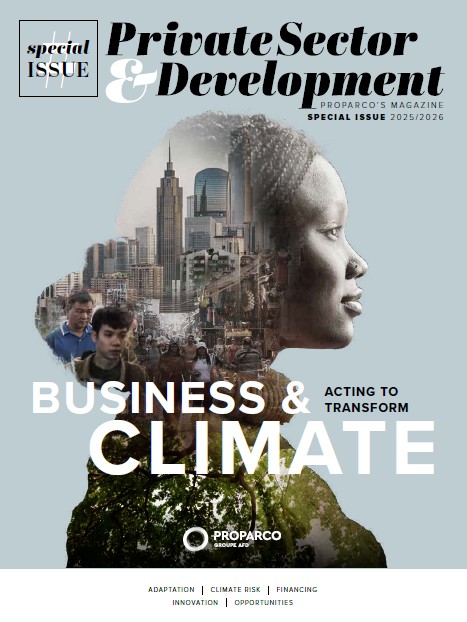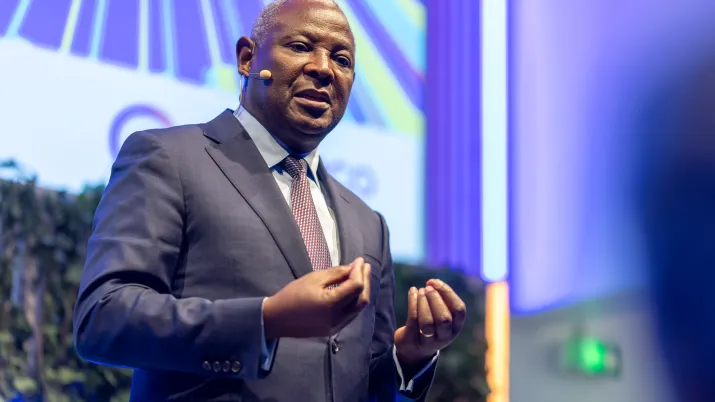Share the page
How financial institutions can drive the transition
Published on


Private Sector & Development - Business & Climate: Acting to transform
Proparco has published a new edition of its Private Sector & Development magazine, focusing on the strategic role of the private sector and financial institutions in tackling the climate emergency.
Climate change is shaking up economic fundamentals and rendering financial models inherited from the past obsolete. As systemic risks accumulate, banks and funds need to go beyond their supporting role and become proactive drivers in the transition. By redirecting capital, rethinking assessment tools and mainstreaming resilience into decision-making, these financial players can become decisive vectors of economic transformation.
Aside from repeated natural disasters, climate change has become a factor in global economic destabilisation. Shortages, supply chain disruptions and political trade-offs: financial assets are being exposed to increasingly concrete and frequent risks that are becoming less and less predictable. At the same time, the fragmentation of climate policies, particularly apparent in the United States, is weakening global coordination in responding to the emergency. “Whether it’s tariffs or rollback of inflation reduction legislation in the United States, I think it’s important to recognize that we are dealing with the economic inefficiency inherent in politics. Every step backward just makes the temperature rise.”, warns David Carlin, consultant and former head of the UNEP FI’s Risk and adaptation programme.
In an unstable geopolitical climate, multilateral commitments are faltering: the Paris Climate Agreement, the Green Climate Fund and common taxonomies are all becoming less straightforward. However, despite the decline in international consensus, climate change remains a major systemic risk that financial institutions must not only take into account, but also place, more than ever, at the heart of their decision-making models, in order to become vectors for the transition of the entire economy. Through their ability to channel capital flows, structure incentives and support transformation trajectories, they are critical levers.
The transition requires new finance models, new ways of thinking about investing and different ways of collaborating and partnering
- Chief Sustainability Officer, Standard Chartered

Emerging markets: challenges and opportunities
In emerging markets, this paradigm shift is really fundamental. As Anita George, founding chair of ProsperETE Capital Advisors stresses, “emerging markets are disproportionately affected by climate change and, within these, it is the poorest people who are the most affected. The role of climate finance cannot just be to finance sectors, it also has to be more inclusive to provide real benefits to the most vulnerable people.” Faced with major climate impacts and inadequate energy infrastructure, these economies have no choice but to innovate rapidly to meet both growing energy demand and environmental challenges.
For Anita George, this is not a constraint but an opportunity that financial institutions need to seize. She stresses that “72% of emissions come from emerging markets, including China, and 28% from developed countries. In many cases, emerging economies don’t have the luxury of the industrial legacy of developed markets. So, when you take energy for example, you need to decarbonize all your existing assets, which typically tend to be composed largely of fossil fuels, but to keep pace with growth you also need to build new assets. 80% of buildings in Africa and 50% in India are yet to be built. If we could only build these in a “clean” way, it would make an enormous difference.” There are numerous domains for action: electric vehicles, energy storage, sustainable agriculture, battery recycling, low-carbon materials.
It’s not enough to sign up for the marathon. That’s the net zero commitment. But you need a training plan to get over the finish line. The transition plan is your firm’s training plan.
- Consultant and former head of the UNEP FI’s Risk and adaptation programme

To convert this potential, a financial ecosystem is needed that can support high-impact players who have the technological solutions but often lack the material and financial resources. Anita George goes on to explain that, “More than 50% of early-stage businesses in countries like India fail. In the US, this figure is three times less. One of the biggest constraints is access to capital. We have to do much more in emerging markets to provide equity financing in the early growth stage. There really is a missing link. So, there’s a huge opportunity for blended finance or catalytic capital. And you don’t need big amounts of private equity. Very small amounts invested wisely can make a massive difference.”
The ProsperETE fund, which she heads up, deploys large-scale mitigation and adaptation solutions using catalytic capital. Transforming business models and investing in the players of tomorrow in these countries therefore requires a major change in performance metrics, which must incorporate the concepts of resilience, adaptation and transition. Anita confirms that “At the current level of uncertainty and unpredictability, the pathway that will gradually build portfolios that may be slightly less efficient, but much more resilient, will be achieved by placing resilience at a much, much higher level than mere ‘accounting efficiency’.”
From ambition to action
Becoming a vector in the transition to a more resilient economy also requires the deployment of robust transition plans. David Carlin insists that, “operationalizing transition finance really becomes the key question. A lot of times people say, “Oh, this is just another reporting exercise”. And I say, ‘No, you can’t afford not to do this, because this is about setting out your strategy.’ It’s not enough to sign up for the marathon. That’s the net zero commitment. But you need a training plan to get over the finish line. The transition plan is your firm’s training plan. A good plan factors in capital reallocation, business models, and the segments of the business that need to grow.” David believes that the best organisations set the standard at the top, disseminate expertise internally, and align incentive schemes with climate objectives.
The British bank Standard Chartered, which operates in 59 countries (including 40 emerging markets), has embarked on this transformation. By 2021, it had aligned its portfolio with a net-zero trajectory, including for Scope 3 emissions and those from the activities it finances, which account for more than 95% of a bank’s carbon footprint according to UNEP-FI. Marisa Drew, Chief Sustainability Officer, Standard Chartered, stresses that “the transition requires new finance models, new ways of thinking about investing and different ways of collaborating and partnering.”
To support this transformation, the bank has created five thematic hubs (carbon, adaptation, blended finance, circular economy, and nature-based finance) with the aim of designing innovative financial structures, channelling capital flows into the right projects and helping clients with their strategic pivots. Marisa goes on to explain that, “these are protected spaces that are staffed with subject matter experts in each particular thematic area. Their role is to design new financial structures, invent innovative methods for capital flows, new partnerships and new arrangements in order to attack some of these challenges.”
Having a brilliant idea is not enough to succeed: you need the right funding to develop and make these innovations affordable and accessible.
- Founding chair of ProsperETE Capital Advisors

Each key sector has been modelled. A decision-making tool now enables any banker to check whether a loan increases or reduces emissions. Marisa Drew reckons that, “Every time the bank wishes to make a loan to “a hard-to-abate” sector, the tool calculates the related emissions and whether this loan will push you above the net zero threshold or whether it will finance a decarbonizing activity. This tool helps structure exchanges with clients, nudge them towards greener businesses and channel capital towards good projects right through 2030.” This strategy, combined with strong internal expertise and appropriate incentives at all levels, is already generating tangible results. Marisa is delighted to note that, “In addition to our net zero 2050 objective, we committed to delivering USD 1 billion in sustainable finance income. Last year we hit USD 982 million, a year ahead of target.”
Standard Chartered has thus demonstrated that a financial institution can combine strategic transformation, long-term resilience and immediate profitability, provided it has a political vision, concrete tools and strong governance. Far from being a cost, the low-carbon transition actually becomes a lever for growth, resilience and competitiveness.



